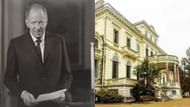Frankfurt-based The Rothschild Family is a powerful banking dynasty. They are one of the most well-known financial houses and were formerly among the wealthiest families in the world.
Their name, zum roten Schild, which means at the sign of the red shield, comes from the residence of their 16th-century forefathers in Frankfurt's Jewish ghetto. They are actually a pan-European Jewish family.
They went on to become one of the richest and most influential families of the 19th century, building magnificent homes and collecting the best artwork. They served as bankers for rulers and governments.
Their rise to fame began in the 1760s with the establishment of Mayer Amschel Rothschild's banking firm. In the Holy Roman Empire, Rothschild served as a court factor for the German Landgraves of Hesse-Kassel in the Free City of Frankfurt.
Though it originally said that they "are a wealthy Ashkenazi Jewish family," the Wikipedia page that has been dedicated to them now describes them as a "wealthy European family." However, no one actually knows who made the edit. Even the context, the source of the edit, or the reason behind the sudden change are still unknown.
This confused a lot of people, who then took to X (formerly known as Twitter) to express their opinion regarding the same.
The Rothschild Family is actually a European Jewish family

As per sources like Wikipedia and Britannica, the empire was founded in the 18th century by Mayer Amschel Rothschild. It rose to prominence under the leadership of his five sons, Nathan, James, Carl, Salomon, and Amschel. Mayer Amschel thought that retaining the company in the family would guarantee its continued success.
Originating from a humble merchant family, Mayer Amschel Rothschild made a name for himself as an ancient coin dealer before joining William, the future Elector of Hesse, as his court agent.
Through their successful investments, the Rothschilds gained a strong reputation for sound financial management across Europe. In addition to its home city of Frankfurt, they also had branches of their financial services in Vienna, Paris, London, and Naples. They were also forerunners in the emergence of global finance.
Mayer Amschel pulled his five sons into the company as it grew to trade government bonds and textiles. These sons then established the family name in London, Paris, Frankfurt, Vienna, and Naples.
The website dedicated to them, rothschildfoundation, claims that the Rothschild family began as a small company that traded goods and foreign exchange. Even now, the Rothschild family still retains considerable financial power. Major infrastructure projects like railroads, tunnels, and bridges are also funded by them.
It further claims that the Suez Canal is conceivably among their most prominent undertakings. Transportation, media, wine, and hotels are some of the other major interests. Furthermore, over time, the company expanded to cover asset management, private banking, merchant banking, venture capital, insurance, pensions and investments, commodities, mergers and acquisitions, and sovereign debt.
The Rothschild family held the largest private fortune in both modern world history and the world during the 19th century. Over the course of the 20th century, the family's wealth decreased and was distributed among several descendants. These days, they have a wide range of interests, including real estate, energy, mining, financial services, winemaking, agriculture, and nonprofit organizations.
As per Investopedia, there are several instances of the family's rustic architecture all over northwest Europe. Conspiracy theories about the Rothschild family have been around for a while, and many of them have antisemitic roots.
However, their origin on their Wikipedia page was recently changed from Jewish to European, which confused a lot of people. They took to X (formerly known as Twitter) to express their opinion regarding the same.
Published on September 19, Jewish Space Lasers: The Rothschilds and 200 Years of Conspiracy Theories by Mike Rothschild, a writer who is unrelated to the bankers he profiles, explores the ways in which this affluent family became the focus of numerous far-right conspiracies.
This book also examines how the Rothschilds became a lightning rod for conspiracy theories throughout the past 200 years and how persistent those claims are to this day, in light of the present rise in antisemitism.
